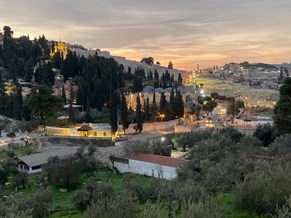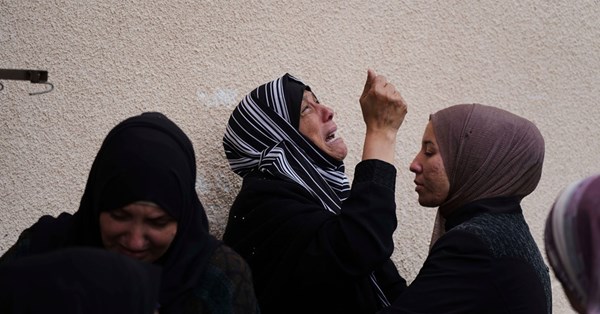I MET Maria 12 months ago, at the girls’ school in the occupied West Bank, where she is the headmistress. It is a Russian Orthodox school, and Maria — who is German and was formerly a maths teacher — is a Russian Orthodox nun. As a teenager, Mother Maria, as she is now known, had longed to meet God, and had set out to do so. She had tried the Lutherans. She had tried the Roman Catholics. She had tried various Protestant churches. Nowhere had she met God.
She was on the verge of lapsing back into the atheism of her upbringing when a friend invited her to attend the Orthodox Liturgy of Easter. And that was it: “God met me,” she said. She was baptised in the Orthodox Church; she became a nun; she tried life in a convent in Greece; and she eventually arrived in Jerusalem.
Her plan was to devote her life to prayer and what the Orthodox call hesychia, contemplation. But, as the saying goes, “If you want to make God laugh, tell him your plans.” A vacancy emerged for the headship of her community’s school. With her teaching background, she was the obvious candidate to fill it.
The stories that we tell about ourselves are important, whether they are stories of a nation or stories of an individual. Stories connect with our hearts, making them leap with joy or grow heavy with despair. They communicate truths of human longing and divine discovery. And they do all this in ways that will always elude the concise prose of reports and analyses. Stories have power.
I met Mother Maria when I was invited to attend her kindergarten’s celebratory performance for the Palestinian Mothers’ Day. It was tear-jerkingly wonderful: little Palestinian girls singing, dancing, waving to their mothers, and addressing their audience in Russian, Arabic, and English. “They are so confident,” I said to Maria. “They need to be,” she replied. “Living where they live and facing what they have to face, they need to be confident.”
She had introduced critical thinking and problem-solving to the school curriculum; she had raised the profile of STEM subjects; and was determined to undergird what was now a largely Palestinian Muslim school with Christian compassion. Maria was trying consciously to rewrite her girls’ national story of occupation, dispossession, exile, and war, with a new story of courage, resilience, and hope.
“WHAT has happened, for all the future bloodshed it will prompt, will be remembered as the moment millions of people looked at the West, the rules-based order, the shell of modern liberalism and the capitalistic thing it serves, and said: I want nothing to do with this,” Omar El Akkad, an Egyptian-born author, writes in One Day, Everyone Will Have Always Been Against This (Canongate Books).
It is a searing new book about the national story, to which many of us probably subscribe, which many of us probably tell, and of which many of us are probably proud. It is the story of the liberal, democratic order of Europe and North America; the story of its free press, and its independent institutions; the story of Magna Carta, representative governments, and personal liberty. It is the order in which he has lived since leaving the Middle East with his family as a young man; and it is the order that, he believes, has perished in the slaughter of Gaza.
 Nicholas PapadopulosA view of Jerusalem
Nicholas PapadopulosA view of Jerusalem
El Akkad contends that the West cannot possibly be what it claims to be, because its leaders and its institutions have comprehensively failed to end what he describes, unhesitatingly, as genocide. “One day”, he writes “when it’s safe, when there’s no personal downside to calling a thing what it is, when it’s too late to hold anyone accountable, everyone will have always been against this.”
Liberal democracy professes regret that, for example, Mother Maria’s girls will grow up facing armed soldiers, checkpoints, and arbitrary detention. But the regret will not translate into a concerted effort to end the panoply of occupation.
Liberal democracy professes its commitment to the sanctity of loving relationships — of motherhood — and its entrepreneurs invent a thousand ways to part us from our cash to prove it. As of last month, up to 20 per cent of pregnant or breastfeeding women in Gaza are malnourished. But the commitment will not translate into the West’s using its influence to secure a just peace for them.
THERE is a story on which liberal Western democracy was built. It is the story of God, who created humanity in love, and the story of God, who redeemed humanity in love. It is the story of the sacred character of this precious earth. It is the story of God’s making Godself vulnerable in Jesus. It is the story that cannot endure the loss of even one mother’s child — and certainly not the 14,000 children who have been killed in Gaza since the beginning of the war.
And the tragedy is that it is a story that our leaders and our institutions are forgetting. Mainstream European culture is hurtling forward “largely without the fuel that Christianity has historically supplied”, the public theologian Rupert Shortt writes in The Eclipse of Christianity: And why it matters (Books, 20 September 2024).
Largely without the story. And this matters: when there is no story to teach that every mother’s child is born in the image and likeness of God, then the assertion that all children are born equal is just that: it is an assertion that the evidence does not appear to support, and an assertion that can easily be contested.
What is the public square of the Western world without the story of Jesus Christ? At best, a framework of laws upheld by the well-meaning; ultimately, a contested arena in which those with deep pockets, loud voices, and well-equipped armies hold sway. We have forgotten the story — and lost the plot.
In Passiontide, we tell the story again: the story of who we are and why we are; the story of where we are from and where we are going. The world needs desperately to hear it — for we are more than that which we are at risk of becoming.
The Very Revd Nicholas Papadopulos is the Dean of Salisbury. This is an edited version of a sermon preached in Salisbury Cathedral on 30 March.

















